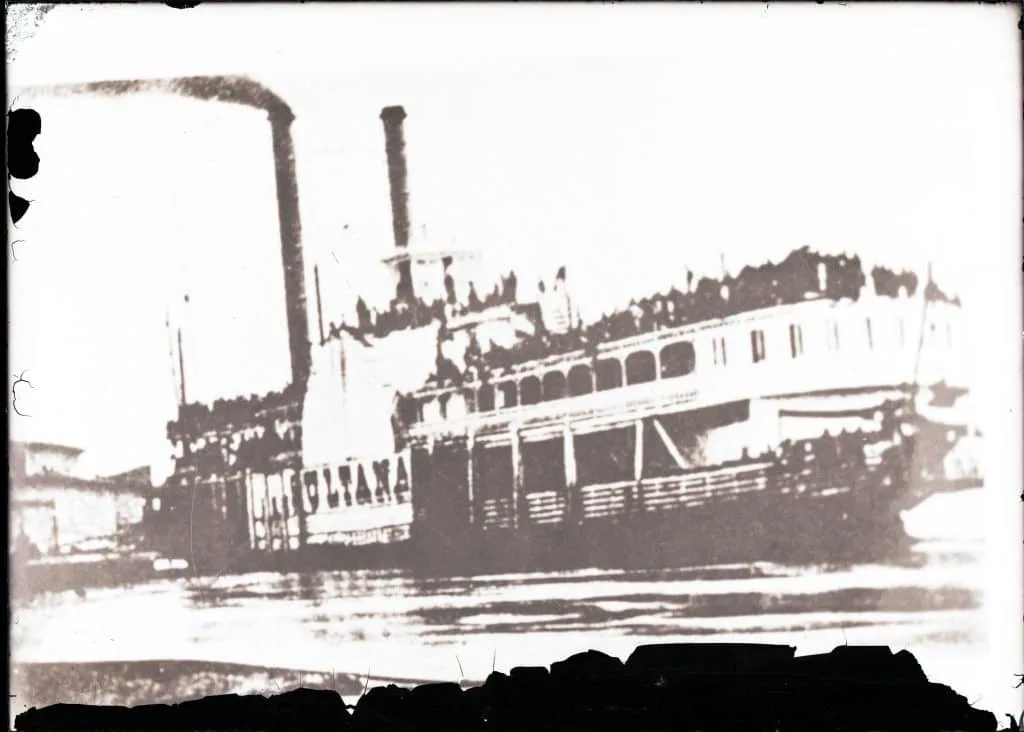The story of the Sultana is remembered throughout the United States as one of the worst maritime disasters in our nation’s history. Federal troops, having just been paroled at Vicksburg after being held captive in Confederate prison camps, were to be loaded aboard steamers and sent north to Cairo, Illinois and back to their families. The Sultana was chosen as one of the transport vessels, but due to miscommunication, greed, and a lack of patience, it was grossly overloaded well beyond its capacity which resulted in a boiler engine eruption killing over 1,100 people on board.
Captain Fredrick Speed had been in charge of loading the newly released prisoners onto transports and therefore became the target of the military investigation that followed the incident. On January 9, 1866 in the courtroom of Warren County’s courthouse at Vicksburg, the Court Martial of Captain Speed commenced. Throughout the Civil War, Vicksburg had been an excellent location for prisoner exchange. Its infrastructure allowed for a large number of men to be brought in and out of the city with relative ease thanks to the river and railroads.
As the conclusion to the War was becoming more apparent, the bureaucracy of exchanging and releasing prisoners of war was just ramping up. In February of 1865, Confederate Colonel Howard Henderson met with Union Colonel Archie Fisk at Vicksburg to discuss having supplies sent to Cahaba Prison in Alabama for the Federal soldiers being held there. In a counter-proposal, Colonel Fisk suggested, “Why not bring the men here under parole and detain them in camp on neutral ground until exchanged?” Colonel Henderson agreed; the efficient option was to bring the men to the supplies. As a result of their meeting, Camp Fisk was established four miles east of Vicksburg.


Union prisoners began flooding into Camp Fisk soon after it was in place. Henderson’s prison brought nearly 3,000 men on its own, and roughly 2,000 more joined them by April of 1865. Conditions in the prison camps prior to Fisk were atrocious. Soldiers being brought into Vicksburg were described as “living skeletons” due to the lack of food, clothing, and an overcrowded prison system. At Camp Fisk, conditions were much more comfortable. Although they were still technically prisoners of the Confederate Army, they had full access to Union supplies.
Things were beginning to look brighter for the Federal prisoners. Well fed and with clean clothes, many were starting to resemble themselves again. Their most pressing issue was how to fight the boredom. They would not have to fight it for long though, as General Lee surrendered to General Grant on April 13th, ending the War, and two days later the first wave of prisoners had been paroled and sent home. Once the parole process officially began, problems began to appear with the soldier rolls. Rolls were incomplete, and the number of men coming into Camp Fisk was not accounted for correctly causing the process to bottleneck. An estimated 11,000 prisoners were now located in Vicksburg, all hoping for a speedy parole so they could return home.
With so many men leaving Vicksburg, the Federal government bought out any steamboat available to transport the newly freed prisoners back up north. At $2.75 per enlisted man and $8.00 an officer, pilots of the steamboats were just as eager as their passengers to make the trip. In charge of arranging safe passage for the soldiers was Captain Fredrick Speed. Born in New York in 1841, Speed moved with his family to Portland, Maine in 1860. Enlisting as a Private in 1861, he was among the first company raised for the Union Army out of Maine. He was promoted to Captain in 1862, and in 1865 was assigned Assistant Adjutant General of the Department of Mississippi to General Dana’s staff at Vicksburg. Believing that there were only 1,400 men still at Camp Fisk, Captain Speed ordered the remainder be placed on the Sultana. In reality, the number of men was closer to 2,200.
The Sultana had arrived in Vicksburg the same day it was loaded and sent north. Upon arriving at the city, it was noted that the “larboard (port) boiler leaked badly” and would need extensive repairs. Instead of allowing time for the repairs to be made, a series of poor decisions led to the boiler only being patched for the trip ahead. Even with a proper repair though, the steamer was only graded for a max capacity of 376 passengers. Whether or not Captain Speed knew of the repair job or the capabilities of the Sultana, it was obvious negligence to allow that many to board a single vessel when others were available. Having made it just seven miles above Memphis, on April 27th, the boiler exploded and the Sultana was enveloped in flames. The pilot, Captain James Cass Mason, was last seen by eyewitnesses still aboard the vessel throwing any floatable objects into the water to help those still trying to escape. His body was never found.
Across the nation, people were in shock at the devastation brought on by the Sultana disaster. Citizens were still mourning the loss of President Abraham Lincoln who had been the target of an assassination just two weeks prior. Papers began churning out stories with the initial estimates of the casualties and theories for the cause. While the majority of the responsibility most likely belonged to Captain Mason for allowing his vessel to be grossly overloaded, investigations quickly placed the blame on Captain Speed and a court martial was issued. Captain Speed’s first recorded correspondence discussing the event was to an unnamed Colonel presiding over the case on May 28th. Protesting a charge brought against him he questioned the Colonel asking, “In what way did I take upon myself duties which did not properly belong to me to perform?” Captain Speed believed that he had done his duty as ordered and pushed the blame on bad information given to him on the actual number of men still at Camp Fisk. Later in the letter he mentions that during the loading of the steamer dividing the men onto multiple boats “would be inconvenient to do so and I expressed an opinion that one boat could carry all the men before I knew their exact number.” As his trial date approached, Captain Speed believed that he would be acquitted of all charges brought against him. In a letter to his father, he expressed this belief claiming the trial was to “cater to the public feeling.”
The Court Martial of Captain Fredrick Speed began on January 9, 1866, and was held at the Warren County courthouse in Vicksburg, MS. Without ever calling Captain Speed to the stand to testify, his defense rested their case on May 29th, and within just a few days on June 5th, his verdict was announced. Guilty on all charges. “Dismissal of service” was his sentence ordered by the court, and the decision was forwarded to Judge Advocate General of the Army, Judge Joseph Holt. In a remarkable turn of events, Judge Holt reversed the court’s decision and cleared Captain Speed of all charges writing, “Terrible as was the disaster to the Sultana, there is no evidence that it was caused by the overcrowding of her decks, and it is therefore difficult to say upon whom the responsibility of the loss of 1,100 lives should rest.” Judge Holt’s recommendation was to publicly exonerate Speed, and on September 1, 1866, Speed was given an honorable discharge from the army.
With the ordeal officially behind him, Fredrick Speed decided to pursue plans he had made during the War to stay in Vicksburg. Speed dabbled in various business ventures over the next two years before making the decision to study law. In 1868, he was admitted to the Mississippi Bar, and just a year later was made a Judge. His legal career would continue until 1880 when he shifted his focus to real estate. Sixty-nine acres were purchased by Speed at the southern edge of Vicksburg for residential development, and the plot became known in town as “Speed’s Addition.” Over time he became beloved within the community being active in the Episcopal Church and the Masonic Lodge. His funeral, attended by hundreds, “started at the Speed residence on Bowman Avenue, headed by a brass band, and proceeded to Christ Church with uniformed Masons following in automobiles and carriages.”
Those aboard the Sultana were deserving of a better fate, but instead suffered greatly due to greed and negligence. Captain Fredrick Speed was fortunate to evade the consequences of the Sultana disaster and make a life for himself in Vicksburg. Though he did share in the responsibility of the event, it’s believed that he was merely a scapegoat who only held a piece of the puzzle. Regardless, the incident will remain a scar on our nation’s history as our worst maritime disaster.
See a typo? Report it here.





